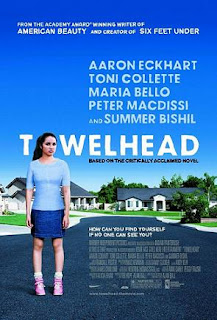Towelhead
 Towelhead is an ambitious and well-meaning film, which chooses to tackle not one but two meaty subjects: racism and the burgeoning sexuality of a young girl. Unfortunately, it is handled so clumsily that I was annoyed through almost all of it.
Towelhead is an ambitious and well-meaning film, which chooses to tackle not one but two meaty subjects: racism and the burgeoning sexuality of a young girl. Unfortunately, it is handled so clumsily that I was annoyed through almost all of it.Summer Bashil plays the role of Jasira, a thirteen-year-old girl who is of mixed race. At the beginning she lives with her mother, but when the live-in boyfriend gets a little too intimate with the girl (he shaves her legs) the mother packs her off to her Lebanese father, who works with NASA. Once there she encounters racism from her schoolmates, and deals with inappropriate attention from an adult neighbor.
The film was written and directed by Alan Ball, who also wrote American Beauty, and he seems to be fascinated with lifting the rock off of suburbia. This film focuses mostly on one cul-de-sac in Houston, which has a lot of bad behavior going on. Herein lies the problem with Towelhead--Ball has so stacked the deck with his characters that the film becomes implausible and grating. Case in point: Bashil's parents are so awful that my teeth were on edge immediately. The mother, played by Maria Bello, takes her boyfriend's side when he dallies with Bashil (she pointedly tells her daughter that it's "all your fault"). The father, Peter Macdissi, is even worse, an insufferable mixture of old-world values and yuppie narcissism. Now, I'm positive that their are horrible parents like this everywhere, but in dramatic construction terms these characters are woefully underwritten.
It doesn't stop there. Bashil's character is so passive you just want to shake her. At one point her father punishes her for using a tampon, which he has outlawed. All I could think was why didn't she tell him that a woman at school gave it to her when she was bleeding?
Then there's Aaron Eckhart as the pedophile next door. His character is very difficult to get a grip on. He seems to exist only as a plot device and to make everyone who watches this film squirm (I am happy to learn that Bashil was actually over-age when she made this film, otherwise it really would have been creepy). The script doesn't have anything insightful to say about such a criminal, so it's hard to understand what the point of it all is.
The only character who makes any sense is a neighbor played by Toni Collette who looks out for Bashil. She seems to have wandered in from the rational part of one's brain, but by the end of the film is obviously set up as the voice of the author's message. That's a hard thing to play, but Collette is up to the challenge.
The sexuality of the film diminishes the more interesting part of the equation--the subtle and not-so-subtle discrimination against Arab-Americans. The title, of course, is an offensive word to Arabs, and the use of the title created some controversy. The film is set during the first Gulf War, and Macdissi's character is very anti-Saddam, although Eckhart assumes he's pro-Saddam. That kind of theme would have made a stronger spine for the picture, rather than the salacious and queasily titillating child-molesting angle.


Comments
Post a Comment